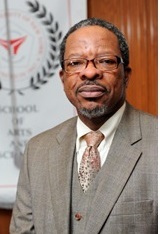The new Vice Chancellor (VC) of the University of Guyana has identified the reaccreditation of the university’s medical school as one of his main priorities.
Professor Ivelaw Griffith who on June 14, 2016 assumed duties as the institution’s tenth VC told reporters at his first press conference yesterday that the university has just submitted a self-study to the Caribbean Accreditation Authority for Education in Medicine and other Health Professions (CAAM-HP) as part of the process of reaccreditation.
“We are fairly comfortable that we are in a good place. We are confident that when the site team comes later this year we will be setting the stage for a full reaccreditation,” Griffith explained.

In 2015, the University of Guyana Medical School (UGMS) lost the provisional accreditation it had first gained in 2008, after it failed to submit annual progress reports.
At that time, CAAM-HP, which was in 2003 established under the aegis of Caricom to accredit programmes of medical education, asked the UGMS to prepare for a full site visit in early 2016 if it wished to regain accreditation.
However, according to Griffith, CAAM-HP will be visiting either in September or October. He noted that the visit will actually be triggered by the recently submitted self-study.
“That site visit will allow us an opportunity to not only show the accrediting agency what we have done but what we have set in motion to do,” Griffith said.
He explained that there are “three or four discrete concerns” affecting accreditation. These include concerns about the school’s facilities, the quality of its teaching staff and the relevance of its curriculum.
“We are in the process of upgrading our facilities,” he said noting that it was important that facilities at the Georgetown Public Hospital also be enhanced to improve the teaching and learning experience.
As regards the teaching and clinical staff of the university, Stabroek News had previously reported that CAAM-HP has asked that the teaching staff be qualified in education as well as medicine.
And with regard to the curriculum, it has not been seriously reviewed since 1994.
“The accreditation agency says it is not tenable to have very minimal, if any, change in your curriculum since in the 1990s, so the onus is on us is to be able to modernize and update the curriculum and we have started that progress significantly and I am hoping that by the time the site team comes in September/ October we will be in a better place,” Griffith told reporters.
He further stated that the medical school will be moving forward under new leadership. Dr Ronald Aaron will be acting as head of the UGMS having been selected to replace Dr Madan Rambaran who resigned.
Griffith said that a resource mobilization conference, which will be hosted next week—June 23 -25—will be used as an opportunity for “education resource ambassadors” to assess the university’s needs “a cluster of which has to do with technology and a whole host of other things not just for medicine but for other aspects of the university.”
The conference will see 48 members of the Guyanese Diaspora joining several local professionals, who have “expressed interest and commitment to contribute financially and technically to taking UG forward.”
According to the new VC, “We find ourselves as a university having more needs than the government can provide for and so it is incumbent on us to extend the perimeter of where we get our resources.
We must look to the alumni in and beyond Guyana, look to the civic community, look to the business community, look to grant funding agencies internationally and build a broad reservoir of resources some of which are not financial.”
He noted that the university struggles to find funding for some basic services and must therefore start exploring what may be “missed opportunities for fees” so as to provide staff with appropriate resources.
“We have got to do better as a university and as a nation in paying staff a decent salary,” he said adding that a salary increase received earlier this year by university staff “was necessary but not sufficient.
“I’ll be working with government to do more at the university including beginning to pay decent salaries to staff, both academic and nonacademic,” Griffith declared.
He explained that he has met with President David Granger and will be meeting with the Ministers of Finance, Public Health and Legal Affairs to set stage to enable UG to get the kind of resources needed.
He however stressed that while he will be approaching the government for an increased subvention to pay better salaries he does not expect to receive all he intends to ask for in that area, and thus will also be requesting changes to several rules and regulations.
“The university has to ask companies and individuals for donations, but I have learnt that Guyana’s tax regulations does not give tax credit to individuals who donate. We will be asking the legislative branch of government to revise regulations so that we are confident then when we approach an individual to give, the law allows those who qualify to have tax credit,” Griffith explained.
According to the VC, the university has had the fortune of growing its student body but the misfortune of not growing the staff or facilities so he will be working towards modernization to ensure that graduates are “credible and respectable products of the university.”
He said, “We have an obligation to do a better job in creating enabling conditions.
Whether I am here for one, two or three terms I want to have been part of a process that enables the university to have excellence as something associated with it…. to have creditability and respectability restored.”




